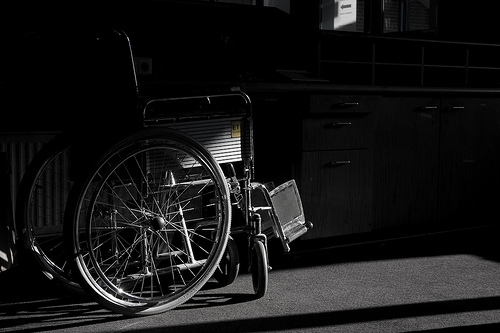


An Arkansas blogger is calling attention to inequities at voting stations in the community where she resides; which she says government funds have already been allocated to correct and are in violation of federal law.
Elaine Canady blogs about issues affecting people with disabilities for the Helena Daily World in Helena, Arkansas, a town with just over 6,000 people in Phillips County, located on Arkansas’ eastern border. (And home of the legendary “King Biscuit Time” radio program!) The bio on Canady’s personal website says she was the first recipient of the Muscular Dystrophy Association’s Personal Achievement Award for the Mid-South District and that she has been advocating on behalf of people like herself “even before the Americans with Disabilities Act of 1990 was passed.”
In yesterday’s “From My View” post, Canady took issue with the lack of accessible voting machines in Phillips County. She recounted the history of laws passed to ensure people with disabilities are given equal opportunity to vote, including the 2002 Help America Vote Act that provides federal funding for states to replace outdated voting mechanisms.
What’s particularly galling to Canady is that the company from whom Arkansas purchases its voting machines offer an accessible model. Yet, despite the availability of both the money and the technology, the basic right to voter privacy in unavailable to people like herself:
How would you like it if you had to tell someone who you want to vote for? When a person with a disability does choose to vote here, they are met with voting machines on stands that cannot be moved to make them accessible. If a person with a disability goes to vote here, they must take someone with them to assist with reaching the machines OR ask someone working at the polling place to assist them.
Despite her outrage, Canedy is still self-effacing enough to close her column by calling on people in wheelchairs to “stand up and fight.” (Canedy was named Miss Wheelchair Arkansas, 1979-80.) In this day and age, when post-election demographics are broken down and analyzed in any number of specialized groupings, she rightly points out that people with disabilities are rendered “essentially invisible” by the process.
As we wrote previously, American Association of People with Disabilities president Mark Perriello has made it an organizational priority to encourage voter turnout among people with disabilities and their families this election year. I’m sure he would agree with Canedy that making sure small communities like Helena comply with the legal requirements of equal access — including spending the money they have been given to enact such measures — is a fundamental step toward inclusion of people with disabilities.
Is your community’s voting facility in compliance with federal laws? Let us know in Comments section.
Image by Marcel Oosterwijk, used under its Creative Commons license.